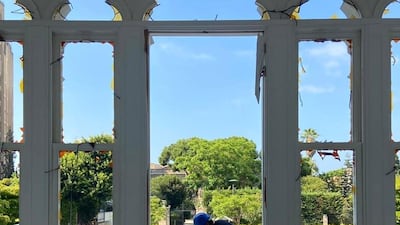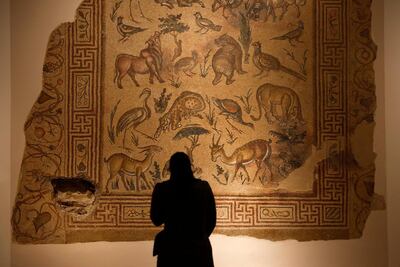As Beirut faces the daunting task of recovery following the major blast on August 4, a number of international museums and heritage organisations are rallying to offer help to the city's arts and culture community.
Last week, 27 international institutions released a joint statement of solidarity, pledging to support the "complete recovery of the heritage that has been damaged in Beirut by this blast".
Among the signatories were Unesco, the International Council of Museums, the Department of Culture and Tourism – Abu Dhabi, the Arab World Institute, the National Museum of China, the Prince Claus Fund for Culture and Development, the World Monuments Fund and the Louvre in Paris.
“Damaged libraries, museums and historic buildings will require cultural first aid and longer-term recovery interventions. Their collections will need urgent protection and salvaging,” the statement read.
On August 10, Unesco held an emergency meeting with Blue Shield, the International Alliance for the Protection of Heritage in Conflict Areas - Aliph, Icom and the International Centre for the Study and Preservation of Restoration of Cultural Property, among others, to understand which places need urgent help and to plan for longer-term recovery efforts.
Unesco is also working with Lebanon's Ministry of Culture, citing an initial damage assessment by its director general of antiquities, Sarkis Khoury.
Buildings in need of urgent repair
The ministry found that at least 8,000 buildings were affected by the explosion. Many of these are in the old districts of Gemmayzeh and Mar Mikhael, and include a number of art galleries and museums.
The damage also extended to 640 historic buildings, approximately 60 of which are at risk of collapse.
Khoury noted that urgent measures towards safeguarding the structures are needed before rainy season approaches in the autumn.
Major museums, such as the National Museum of Beirut, the Archaeological Museum of the American University of Beirut and the Sursock Museum, were severely affected by the blast. The Sursock Museum had to move artworks into storage after its roof and facade were damaged, while the Archaeological Museum will require restoration for a number of artefacts.
The struggle for Beirut’s arts and culture community is to raise enough funds to begin repairs as soon as possible. Before the explosion, Lebanon had been facing economic turmoil following the depreciation of its currency.
The Prince Claus Fund in Amsterdam is currently seeking to establish a fundraising platform with organisations in Beirut.
Recently, the Arab Fund for Arts and Culture and Culture Resource (Al Mawred Al Thaqafy) launched the Lebanon Solidarity Fund as a way to manage donations and oversee reconstruction. The campaign appeals to international institutions to donate money that will go to much-needed repairs and help to rehouse artists.
“We need the solidarity of these partners and friends, and we therefore call for their contributions,” they said.



